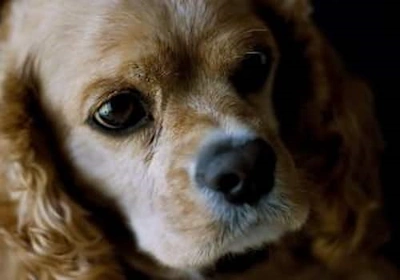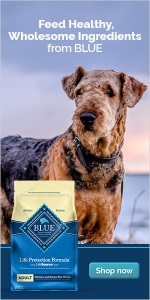Dry Eye In Dogs
Corneal damage can result from dry eye in dogs if not treated promptly.
What is Dry Eye In Dogs?
If your dog has lost the sparkle in his eyes, it may be the result of diminished tear production and/or a condition known as canine dry eye, medically referred to as Keratoconjunctivitis Sicca.
 Cocker Spaniel
Cocker SpanielWhen a dog has this condition, it means that his eyes are no longer receiving a sufficient amount of aqueous tears necessary for eye lubrication and/or the tear film is evaporating too quickly.
The loss of lubrication robs the cornea of oxygen and nutrients vital to its health and the subsequent dryness causes the cornea to become destructively irritated.
It is a condition not to be ignored
in order to avoid progressive corneal damage.
If you suspect your dog is suffering from dry eyes, which can lead to vision loss, don't wait to get a professional
diagnosis and necessary treatment.
Signs of Dry Eye In Dogs
- Have your observed your dog rubbing his paw across his eyes in a distressful way?
- Do his eyes look dull, less bright or even cloudy?
- Is there any redness or irritation present?
- Have you noticed an accumulation of mucus discharge on the eyeball?
- Does he seem tired?
 Image: J.Mills
Image: J.Mills
Causes of Dry Eye in Dogs
Dogs suffering from dry eye may have undergone surgery which included the
removal of the tear producing lacrimal gland behind the third eyelid.
This gland is responsible for a significant portion
of the tear production necessary to maintain the health of a dog's eyes. Once this gland is removed, a dog is at
a much higher risk for dry eye.
Although any breed can be affected by this condition, some breeds of dogs are more prone to dry eyes. Among them are
Shih Tzus, Cocker Spaniels, Lhasa Apsos, Schnauzers and Bulldogs.
- Some veterinarians believe that liver problems may trigger dry eye.
- Canine diseases may result in injury to tear glands. These include Distemper, Rheumatoid Arthritis or Addison's
- Ear infections may extend damage to nerves involved in tear gland function.
- Immune system dysfunctions.
- Sulfa-based medications.
Sometimes the cause of dry eye in dogs is just not apparent.
Treatment of Dry Eye In Dogs
Various medications and treatment options may be recommended based on the status of the condition. The main
objective being to restore lubrication to the eyes, as well as reignite tear production.
- Cyclosporin is frequently prescribed when immune-mediated damage to the lacrimal glands is diagnosed as the underlying cause of dry eye. This medication, which is an immuno-suppressive drug, is reported to be very successful in reversing the destructive process and increasing tear production.
- Artificial tears may be recommended until an increase in tear production is attained sufficiently through other remedies. Sometimes they need to be continued indefinitely.
- When thick mucus discharge is present on the eyeball, mucolytic drugs may be prescribed to reduce the thickness and buildup.
When the dry eye condition has resulted in irreparable damage to the lacrimal gland, the only remaining option may be surgical intervention.
One such approach involves surgical repositioning of a salivary gland located near the ear, to the corner of the eye, thereby providing saliva as a substitute lubricant to treat dry eye.
However, this approach is rarely done
because
of its downsides which should be fully explained by a veterinarian before a dog
owner considers this course of action.
Have your dog checked out for any liver problems. Some vet experts
believe there is a connection between liver problems and dry eye.
Prevention of Dry Eye In Dogs
Since there is no known cure for this eye disorder, the ideal approach is to:
- Keep your dog healthy with the best nutrition along with an antioxidant eye supplement such as Ocu-Glo.
- Inspecting his eyes every week, cleansing them as needed
- Scheduling regular eye exams by a professional, to ensure the best of preventative care.
Following this regime, if and when eye problems are encountered, they will receive prompt treatment and the best chance of a successful outcome.
Natural Approaches To Dry Eye In Dogs
Holistic veterinarians consider both conventional and alternative viewpoints in seeking the underlying causes of canine eye problems as well as other pet ailments.
When treating
disorders, they treat each pet as unique and may often use a combination of homeopathic,
herbal and/or nutritional therapies along with conventional remedies as needed by your dog. In other words, not a one size fits all.
With the approval of your vet, you many wish to incorporate the use of natural substances that contribute to eye health
along with the main treatment of your dogs dry eye condition.
Before You Go...
If you like the content of this page, as well as others on my site, please give it some love by clicking on the heart in the lower right hand corner. This helps me keep providing enjoyable and useful content.
Thank you.
Related Pages
Image: Joel Mills / CC BY-SA (http://creativecommons.org/licenses/by-sa/3.0/) commons.wikimedia.org/wiki/File:Corneal_ulcer.JPG

